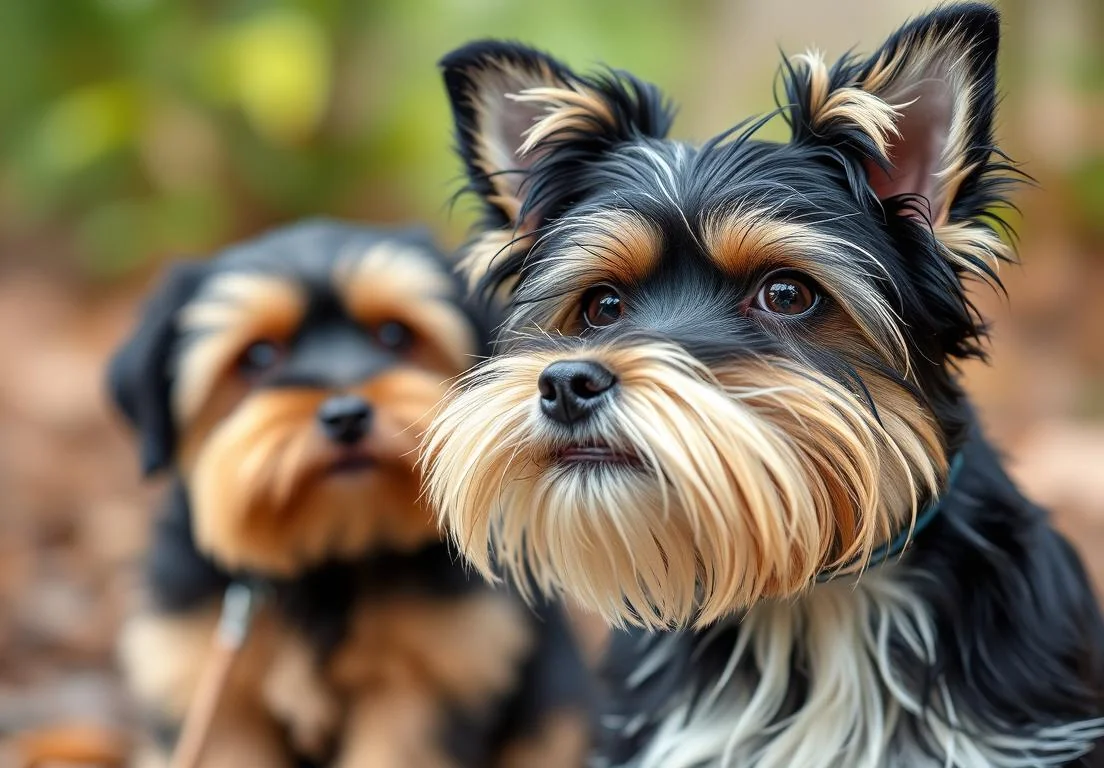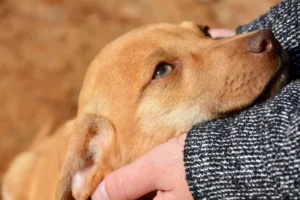Yorkshire Terriers are not just small dogs; they are bundles of energy wrapped in silky coats with hearts full of love. These spirited little companions bring joy, loyalty, and plenty of personality to any home.
Yorkshire Terriers are an affectionate toy breed known for their lively nature and strong bond with their owners. They make perfect companions for those seeking a loving pet with a big personality. But there’s a lot more to these charming little furballs, including care tips, health considerations, and interesting tidbits that will make you appreciate them even more.
Here’s a brief overview of the breed:
| Aspect | Details |
|---|---|
| Personality | Affectionate, energetic, and loyal. Thrives on human interaction and forms strong bonds. |
| Size | Small (4-7 lbs). Teacup varieties (2-3 lbs) require extra care. |
| Coat & Grooming | Long, silky blue-tan coat; daily brushing and regular trimming needed. |
| Exercise Needs | ~30 minutes/day. Enjoys walks, play, and mental stimulation like puzzle toys. |
| Training | Intelligent but stubborn. Short sessions with positive reinforcement work best. |
| Health Concerns | Prone to dental issues, patellar luxation, tracheal collapse, and hypoglycemia. |
| Diet | High-quality food for toy breeds; portion control is key to prevent obesity. |
| Lifespan | 12-15+ years with proper care. |
| Fun Fact | Originally bred for catching rats in textile mills and mines. |

What makes Yorkshire Terriers so special?
Yorkshire Terriers, often affectionately referred to as “Yorkies,” pack an oversized personality into a tiny package. This breed’s standout characteristics are hard to miss. For starters, their affectionate nature makes them ideal companions. Yorkies thrive on human interaction, often forming strong bonds with their owners. They’re playful and curious, always on the lookout for fun, whether it’s a game of chase or snuggling up on the couch.
Their intelligence is another defining trait. These little dogs are quick learners and respond well to training. This makes them not only entertaining but also manageable for owners who enjoy teaching tricks or commands. However, it’s worth noting that their spirited nature can lead to a stubborn streak. Training requires patience and positive reinforcement, but the results are well worth the effort.
Yorkies also have a distinctive appearance, with their long, silky coats that can be styled in various ways. Their coat color—typically a mix of blue and tan—adds to their charm. Despite their small stature—averaging around 4 to 7 pounds—they have a confident demeanor that often belies their size.
Ultimately, the combination of their affectionate temperament, intelligence, and unique looks forge a special place for Yorkshire Terriers in the hearts of dog lovers everywhere.
How to choose the right Yorkshire Terrier for you
Selecting the right Yorkshire Terrier goes beyond simply liking their looks; it’s about finding a match for your lifestyle. Consider these key factors when you’re on the hunt for your perfect pup:
-
Energy Level: Yorkies have a lively spirit and need regular exercise—about 30 minutes a day. If your lifestyle is on the quieter side, look for a more laid-back individual or consider adopting an older dog who may require less activity.
-
Temperament: Puppies can be a handful, displaying that famous spunk. If you prefer a more relaxed atmosphere, keep an eye out for a calm demeanor in adult dogs. Don’t shy away from meeting different personalities before making your choice.
-
Size: While most Yorkies fall within a standard size range, Some breeders may offer teacup varieties that weigh as little as 2-3 pounds.These pint-sized pups can be a delight, but they also require extra care due to their fragility.
- Health Screenings: Reputable breeders conduct health tests to identify potential genetic issues. Always ask for health clearances and be wary of any signs of common Yorkshire Terrier health issues, like dental problems or patellar luxation.
Taking the time to consider these aspects can help you find a Yorkie that fits seamlessly into your family dynamics. By aligning your lifestyle with the right canine companion, you’re setting the stage for a joyful relationship that benefits both you and your new furry friend.
What should you feed your Yorkshire Terrier?
Nutrition plays a vital role in keeping your Yorkshire Terrier healthy and lively. Since they’re small but mighty, it’s essential to fuel them right to match their spirited personality. Focus on a high-quality, balanced diet that’s tailored to their size, age, and activity level.
Opt for premium dry kibble specifically formulated for toy breeds. Look for options that list real meat as the first ingredient and avoid fillers like corn and soy. These dogs have tiny stomachs, so small kibble pieces are preferable; they not only find it easier to chew but also digest more comfortably.
Consider supplementing their diet with wet food occasionally. It can enhance flavor and hydration. You can also treat them to fresh vegetables like carrots and peas. Just remember to steer clear of toxic foods like chocolate, grapes, and onions. It’s always best to check with your vet before introducing new items to their diet.
Portion control is crucial too. Overfeeding can lead to obesity, which is detrimental to their health. A rough guideline is to feed them about 1/3 to 1 cup of food per day, split into meals.
The recommended daily caloric intake for Yorkshire Terriers varies based on their age, size, and activity level. Adult Yorkies typically require about 45 calories per pound of their body weight, while puppies need around 53 calories per pound. For puppies, the suggested food intake is approximately 1/4 to 1/2 cup of food per day, split into multiple meals (3 to 4 meals). In contrast, adult Yorkies can sustain themselves on two meals a day with appropriate portion control to maintain their health and avoid obesity.
Adjust portions based on their weight and energy levels, and always provide fresh water to keep them hydrated.
Lastly, pay attention to their weight and coat condition. A healthy Yorkshire should have a shiny coat and stay spry. Regular vet check-ups will also help you fine-tune their diet over time.
How to train your Yorkshire Terrier effectively
Training a Yorkshire Terrier can be a delightful experience, especially when you appreciate their spirited nature. These dogs are intelligent, but they can also be a tad stubborn. So, a little patience goes a long way.
Start with positive reinforcement techniques—dogs thrive on praise and treats. Use small, tasty treats that they can’t resist, and be consistent with your commands.
Short, fun training sessions work best. Aim for about 5-10 minutes per session to keep them engaged and prevent frustration.
Socialization is key, too. Expose your Yorkie to different environments, people, and other pets. This will help reduce anxiety and teach them how to behave in various situations. Group training classes can provide excellent exposure and help them learn alongside other dogs.
Be mindful of their territorial tendencies; Yorkies can be prone to barking. Teach the “quiet” command early on to curb excessive barking. Use distraction techniques or offer a toy when they start barking to redirect their focus.
Finally, channel their energy into fun activities. Engage in agility training or take walks to burn off steam. These spirited pups adore mental stimulation, so puzzles and interactive toys can keep them entertained while reinforcing training.
Remember, the goal is to build a strong bond with your furry friend while teaching them good behavior in a supportive, loving way.
What health issues are common in Yorkshire Terriers?
Yorkshire Terriers often lead vibrant lives, but like many small breeds, they come with a slate of potential health concerns. Knowing these issues can help you provide the best care for your spirited companion.
One significant concern is dental problems. Due to their small mouths, Yorkies can suffer from overcrowded teeth, which may lead to periodontal disease. Regular dental cleanings and daily tooth brushing can mitigate these risks.
Patellar luxation, or dislocated kneecap, is another common issue, especially in younger dogs. Symptoms often include limping or skipping on a leg. Keeping your pup at a healthy weight and avoiding high-impact activities can help ease the strain on their joints.
Tracheal collapse is also a possibility in this breed. It’s marked by a honking cough, often worsened by excitement or collar pressure.
Tracheal collapse is a common condition in Yorkshire Terriers and other small breeds, characterized by a narrowing of the trachea that can lead to significant respiratory issues. Affected dogs often exhibit a harsh, “goose-honking” cough that may be exacerbated by excitement, exercise, or pressure from a collar. As the condition progresses, it can lead to increased respiratory distress, and in severe cases, can cause cyanosis, fainting, or collapsing. Management typically includes medications such as cough suppressants and anti-inflammatories, as well as lifestyle changes like using harnesses instead of collars to reduce neck pressure. Regular veterinary check-ups are crucial for monitoring the condition and adjusting treatment as needed.
Opt for a harness instead of a collar to reduce pressure on their neck.
Lastly, watch for hypoglycemia, particularly in puppies, as their tiny bodies can struggle with blood sugar regulation. Keeping regular feeding schedules and providing high-quality food can be key here.
Awareness of these health challenges allows you to be proactive. Regular vet check-ups are essential to spotting potential problems early and keeping your Yorkie happy and healthy.
How to groom your Yorkshire Terrier like a pro
Grooming a Yorkshire Terrier can feel daunting, but with the right techniques, it can be a fun bonding time. Their beautiful, silky coat requires regular attention to stay in top shape.
Start with brushing. Aim for daily grooming to prevent mats and tangles. Use a slicker brush followed by a wide-toothed comb, especially around the ears, underbelly, and legs where tangles might hide.
Next, bathing should happen about once a month. Use a gentle, dog-specific shampoo to maintain moisture in their coat. After bathing, be sure to use a conditioner that suits your dog’s coat type; leave-in conditioners are a great option for Yorkshire Terriers due to their long hair.
Once dried, check for ear and eye care. Clean their ears weekly with a dog-safe solution, and wipe the corners of their eyes gently to prevent staining.
For the finishing touches, consider trimming their hair every six to eight weeks. If you’re not confident with scissors, a visit to a professional groomer may be beneficial.
An extra tip? Store grooming supplies in one basket for easy access—your brush, shampoo, and clippers all in one spot can streamline the process. Familiarizing your Yorkie with grooming from a young age will ease their anxiety and turn each session into a positive experience!
Tailoring your grooming routine to your Yorkie’s needs not only keeps them looking sharp but also strengthens your bond with them.
What are some fun activities for Yorkshire Terriers?
Yorkshire Terriers are full of energy and ready to play! To keep your spirited pup entertained and engaged, think about incorporating a blend of physical and mental activities into their routine. Here are some engaging options:
1. Fetch: A classic game that never gets old. Use a soft toy that’s easy for your Yorkie to carry. Just toss it a few feet away and let them sprint after it!
2. Hide and Seek: This isn’t just for kids! Command your dog to stay, then hide somewhere in your home. Call them once you’re hidden and let them use their keen sense of smell to find you.
3. Obstacle Course: Set up a simple course in your yard or living room using everyday items like chairs, boxes, and tunnels. Guide your Yorkie through it for some fantastic exercise and fun.
4. Training Sessions: Incorporating short training sessions not only teaches your pup new tricks but also stimulates their minds. Try teaching commands like “roll over” or “play dead.”
5. Puzzle Toys: Invest in puzzle toys that dispense treats. These can keep your furry friend busy while they work to figure out how to get to the rewards inside.
6. Agility Training: If you have the space, consider agility training. There are even classes available just for small breeds. It’s a great way for Yorkies to burn off some energy while honing their skills.
7. Playdates: Socializing with other dogs can be incredibly stimulating. Set up meet-ups with fellow dog owners so your Yorkie can enjoy some furry companionship.
Mixing up these activities keeps things exciting for your Yorkshire Terrier and strengthens your bond with them. They’re not just pets; they’re family who deserve the best!
Interesting trivia about Yorkshire Terriers
Did you know that Yorkshire Terriers have a rich history? Originally bred in the 19th century by working-class individuals in England, they were used for catching rats in textile mills and mines.
Their tiny size didn’t deter their tenacity!
Another fascinating tidbit: the Yorkie has made numerous appearances in popular culture. They’ve been featured in movies, TV shows, and even as fashion accessories for celebrities. Think of Legally Blonde where a Yorkshire Terrier named Bruiser captures hearts.
Additionally, the breed has a remarkably long lifespan compared to many larger breeds. With proper care, a Yorkie can live between 12 to 15 years, sometimes even longer.
Their charm and loyalty have led them to become one of the most beloved toy breeds around.
These spirited little dogs pack quite a punch, showcasing bravery and affection that draw people in. Don’t just take their size at face value; they often consider themselves big dogs in tiny packages!
How to build a strong bond with your Yorkshire Terrier
Yorkshire Terriers thrive on connection. To foster a solid bond with your spirited little companion, focus on three key elements: socialization, affection, and play.
Socialization is vital. Start young by exposing your Yorkie to various environments, people, and other pets. This helps them become well-adjusted and confident. Consider puppy classes or dog parks to enrich their social experiences. Regular socialization can curb potential behavioral issues down the line, making for a happier, more adaptable dog.
Affection builds trust. Be generous with petting, cuddling, and affirmations. Speak to them in a gentle tone; Yorkies are sensitive and respond well to loving interaction. Establishing a routine that includes quiet time together enhances the bond. They’ll feel safe and cherished, which reinforces their loyalty to you.
Playtime is where the fun happens. Engage in interactive games like fetch or hide-and-seek, which not only provide physical exercise but also mental stimulation. Yorkshire Terriers love to showcase their intelligence, so puzzle toys can keep them entertained and satisfied. This also reinforces your role as a fun and engaging owner.
Unique Insight: Incorporating training sessions into your play can elevate your bond further. Use positive reinforcement techniques with treats and praise to teach basic commands or fun tricks. This not only enhances their obedience but also creates rewarding moments for both of you. You’ll see the direct benefits of a well-trained dog, which leads to a more harmonious relationship.
Building a strong bond with your Yorkshire Terrier takes time, patience, and consistency. By focusing on socialization, affection, and play, you’ll cultivate a deep, loving relationship that’s sure to enrich both your lives.
Alex, a passionate animal lover, has experience in training and understanding animal behavior. As a proud pet parent to two dogs and three cats, he founded AnimalReport.net to share insights from animal experts and expand his knowledge of the animal kingdom.




